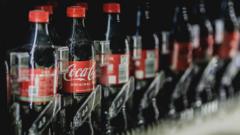As the beverage giant processes upcoming tariffs on aluminium, their sustainability initiatives face scrutiny due to potential increases in plastic usage.
Coca-Cola Considers Increased Plastic Use Amid Trump Tariffs on Aluminium

Coca-Cola Considers Increased Plastic Use Amid Trump Tariffs on Aluminium
Coca-Cola's CEO indicates potential shift to plastic bottles if tariffs raise aluminium costs, raising environmental concerns.
In a recent investors' call, Coca-Cola CEO James Quincey outlined the company’s potential pivot towards plastic bottles in response to escalating aluminium prices induced by tariffs implemented by President Donald Trump. The 25% import tax on steel and aluminium is expected to significantly inflate the costs of canned beverages across the U.S. market.
As a consequence, Coca-Cola may modify its packaging strategies to maintain affordability, signaling that if aluminium cans become pricier, the company may revert to more plastic offerings, specifically PET bottles. Quincey noted, "If one package suffers some increase in input costs, we continue to have other packaging offerings that will allow us to compete in the affordability space." This proposed strategy comes at a time when environmental organizations have labeled Coca-Cola as the "top global plastic polluter" for the sixth consecutive year.
This potential shift comes despite the company's previous commitment to enhancing its sustainability practices. Last December, Coca-Cola revised its target for incorporating recycled materials in packaging from 50% by 2030 to 35%-40% by 2035, raising concerns from environmental activists over the company's long-term environmental impact.
Moreover, while aluminium containers are typically viewed as a greener alternative due to their recyclability, the looming tariffs threaten to diminish Coca-Cola's recent trend of increasing its use of aluminium packaging. Statistics reveal that the U.S. relies on imports for nearly half of its aluminium, indicating that the tariff’s effect could lead to inflated costs for aluminium cans.
Further complicating the environmental landscape, Trump also signed an executive order this week that dismantles efforts initiated under former President Biden aimed at reducing plastic usage, including the push to phase out plastic straws. This order may exacerbate ongoing issues related to plastic pollution at a time when addressing such crises has been deemed essential by environmental advocates.
As Coca-Cola navigates these turbulent waters, the intersection of economics and sustainability remains a complex challenge for the iconic beverage brand.
As a consequence, Coca-Cola may modify its packaging strategies to maintain affordability, signaling that if aluminium cans become pricier, the company may revert to more plastic offerings, specifically PET bottles. Quincey noted, "If one package suffers some increase in input costs, we continue to have other packaging offerings that will allow us to compete in the affordability space." This proposed strategy comes at a time when environmental organizations have labeled Coca-Cola as the "top global plastic polluter" for the sixth consecutive year.
This potential shift comes despite the company's previous commitment to enhancing its sustainability practices. Last December, Coca-Cola revised its target for incorporating recycled materials in packaging from 50% by 2030 to 35%-40% by 2035, raising concerns from environmental activists over the company's long-term environmental impact.
Moreover, while aluminium containers are typically viewed as a greener alternative due to their recyclability, the looming tariffs threaten to diminish Coca-Cola's recent trend of increasing its use of aluminium packaging. Statistics reveal that the U.S. relies on imports for nearly half of its aluminium, indicating that the tariff’s effect could lead to inflated costs for aluminium cans.
Further complicating the environmental landscape, Trump also signed an executive order this week that dismantles efforts initiated under former President Biden aimed at reducing plastic usage, including the push to phase out plastic straws. This order may exacerbate ongoing issues related to plastic pollution at a time when addressing such crises has been deemed essential by environmental advocates.
As Coca-Cola navigates these turbulent waters, the intersection of economics and sustainability remains a complex challenge for the iconic beverage brand.


















